Zsolt Monszpart reminded that the promotion of cooperation in science and innovation between the V4 countries was also a priority for the Hungarian V4 Presidency in 2013 as these joint programmes significantly contribute to the successful participation of member states in international RDI initiatives. He added that the UK is a key partner for the V4 countries in research, development and innovation. Zsolt Monszpart acknowledged the existing strong cooperation relationships which have great future prospects irrespective of Britain’s EU membership.
David Golding, head of European and global engagement for Innovate UK, the British innovation agency, said that the pillars of the British innovation environment include the world-leading universities and research centres, the long-established traditions of innovation, the RDI networks and centres, the various forms of public funding and the strong investment community. He also mentioned the Catapult network which was found and supported by Innovate UK to enhance synergies between the researcher community and the business sector. The centres of the network are located in geographical hubs across the UK in sectors of high market potential, such as energy systems, medical development, space applications, information technology and transportation systems. The centres closely cooperate with research institutions as their expertise helps them stay “one step ahead of the market” and provide new business opportunities. The relevant experience was summarised by Joanne Cox and Henrieta Sanislova.
Presentation of David Golding: Innovate UK (PDF, 681 KB)
Presentation of Henrieta Sanislova: Catapult Overview (PDF, 1 187 KB)
The V4 representatives talked about the common challenges resulting from the countries’ similar history (mainly the partnering difficulties between the research and industry sectors) and presented the new RDI programmes.
Przemyslaw Sobanski and Marcin Wiatrow from the Ministry of Higher Education and Science of Poland reported that the Ministry is about to launch the Łukasiewicz research network of nearly 40 institutions with the aim of stimulating research and the commercial utilisation of results.
Presentation of Przemysław Sobanski és Marcin Wiatrów: Good practices of industry-academia co-operation in Poland (PDF, 648 KB)
Jaroslava Szüdi from Slovakia presented a national project which fosters the practical implementation of knowledge and technology transfer. The project aims to enhance technology transfer, commercialisation and the creation of spin-offs at research institutions and universities.
Presentation of Jaroslava Szüdi: Cooperation between industry and research organizations – sharing practice from Slovakia (PDF, 1 740 KB)
The Czech GAMA programme was presented by Martin Duda, board member of the Technology Agency of the Czech Republic (TAČR). In this programme it is not the researchers but the research centres and universities that submit a complex umbrella project proposal to the agency. When awarding the funding, the agency considers whether the applicant institution has the research and innovation expertise and experience for creating innovative, competitive results, prototypes and products, as well as the institution’s commitment to industrial and commercial utilisation. To this end, each institution is required to establish a “commercialisation council” with at least half of the members delegated by the industry, and also have to ensure the operation of an office responsible for technology transfer. When a project is selected for funding, the institution receives the funding from the agency and distributes it to its researchers and lecturers in the framework of RDI calls. As an important advantage, the GAMA system enables a quicker launch of the winning local projects than in the traditional system, while improving institutional responsibility and strengthening the innovative and competitive spirit among researchers and lecturers. One million euros (160 to 170 thousand per year) are earmarked for the umbrella funding programme. Lucie Kučerová from the Ministry of Education of the Czech Republic presented a funding scheme announced by the managing authority responsible for the Structural Funds and aimed at encouraging research organisations to develop industrially applicable solutions, and highlighted the challenges of compliance with the rules of public funding during the design of the programme.
Presentation of Martin Duda: TA CR – research useful to society (PDF, 516 KB)
Presentation of Lucie Kučerová: The Call Long-Term Intersectoral Cooperation (PDF, 708 KB)
Hungary was represented by the Centre for Higher Education and Industrial Cooperation (BME–FIEK) established at the Budapest University of Technology and Economics on the initiative of the NRDI Office. Head of department and project segment manager Hassan Charaf and project director László Lengyel explained that the BME–FIEK is a model system in which complex industrial challenges are addressed by collaborating university faculties. To this end, the BME–FIEK plans to develop a laboratory structure that fits future demand, increase the RDI capacity and competence of the university with an aim to offer them as a service, and create a sustainable form of industry–university cooperation.
The BME–FIEK focuses on pharmaceutical and energy development made more competitive with ITC solutions. In January 2018 they presented a new Industry 4.0 Technology Centre which provides information about twelve industry 4.0 solutions to SMEs which are not prepared for the impending industrial revolution. Hassan Charaf also pointed out that the FIEK considers it a key priority to change the R&D culture at universities: researchers must learn how to keep the pace set by the industry and speak the same language as industrial professionals. Young researchers at BME–FIEK are already benefiting from the environment characterised by the new approach.
Presentation of Hassan Charaf előadása letölthető itt: BME–FIEK (PDF, 2 446 KB)
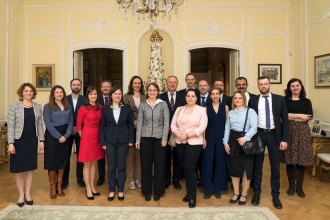 |
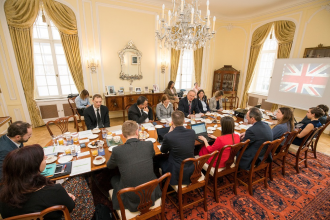 |
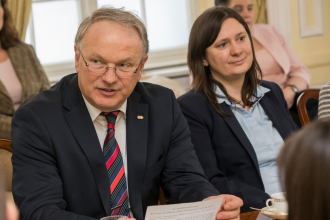 |
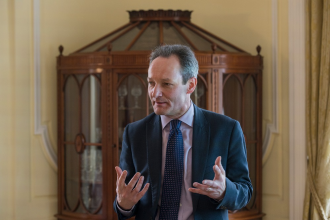 |
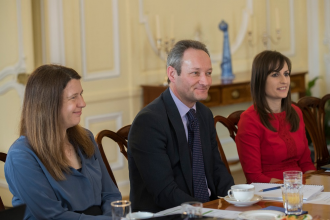 |
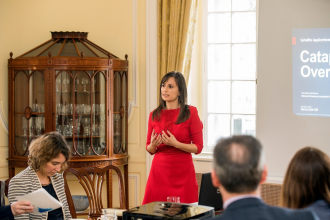 |






